- Home
- James David Victor
A I Apocalypse Page 5
A I Apocalypse Read online
Page 5
Eliard reflected that his father was perhaps the most warlike person that he had ever had the misfortune of knowing. Not warlike in the way that the Duergar were warlike—that large, troll-like alien species with their shovel-heads and tusks and bodies that were almost double the width of even the widest human—but warlike in the way that everything had been a battle, a strategy, to the lord general.
His father had impressed upon Eliard the fragility of humanity, and importance of the noble houses—and of course House Martin in particular—in keeping the Imperial Coalition and humanity together. Eliard had grown up with the sense that at any time, the Imperial Coalition might break apart or that some new threat would wipe out their wonderful technologies, leaving each of the outposts of humanity vulnerable and alone.
Which was why the old lord general had insisted on a limit to machine intelligence on Branton, not even owning a house intelligence worthy of the self-aware name. Instead, the lord general had ensured that his people were reliable and tough, and that they knew how to toil and survive with their own labors.
Which meant that the medical suite would be next to useless, as well! Eliard grumbled as he turned once in the atrium and took the stone steps up to the next level of the building, where a host of service quarters should be stationed: cleaning rooms, wash rooms, medical suites, and workshops.
His father had been so insistent on this tough legacy of self-reliance that he had even banned genetic aging treatments on Branton, insisting that while the other noble houses, like the Selazars, could pretend to live forever, the Martins would have no such truck with their ghoulish customs.
Which is probably why you died on one these medical gurneys instead of having the nanobots injected that would have remade your body, you old fool! Eliard thought as he swept onto the corridor containing the medical facilities. Not that Eliard was any great fan of the nano-genetic therapies—there was something in him that was grudgingly proud of the fact that his body was still his own—but he shied away from giving his father the benefit of that biological pride.
This corridor was just as ruinous as the rest of the palace, Eliard saw as soon as his boots stepped onto the still-glossy white-marble floors. The upper atrium, as this corridor was known, was marked by the windows overlooking the courtyard on one side, while on the other were the arched doorways that led into various bays and rooms. In each case, once again, the metal doorways had been ripped from their emplacements and had vanished, leaving nothing but wires and connector ports.
“Why would anyone loot all the doors in this place?” Eliard almost laughed, it was such a ridiculous observation. But it was a queasy sort of humor, pointing at something that he didn’t understand. Not yet.
The first room was a wash room, without its door but still with its cerulean blue and pastel tiles, and—
The washing unit had been ripped from the wall, and its sleek white plastic shell was in pieces on the floor, exposing its innards of rubber and copper tubing, and electronic controls, all smashed.
“Weird.”
Eliard moved to the next room, which should have been the first of the medical bays, complete with automated diagnostic machines and drone-surgeons that could treat almost any malady that affected the human body. In here he hoped that even if the electrics were down on this ruined world he would be able to find emergency medical supplies—energy and protein packs, stimulant injectors, liquids, everything that his aching body needed right now.
“And then all I have to do is find a ship off this planet, and jump back to Esther…” Eliard was almost feeling, if not hopeful, like he might have a direction to go in.
But he stopped dead when he saw the wreckage of this room. The computer bed was smashed and mangled beyond repair as if a team of drone laborers had taken their claw arms and vice attachments to it, mercilessly. The diagnostic computer interface that should have been on the wall was ripped from its seat like a tooth from a jaw and smashed into a hundred pieces. The cupboards were ripped open and ransacked.
But it wasn’t even this insult that affected Eliard the most. It was the fact that the criminals behind the sabotage had left him a message.
There, scrawled on the wall in dried red spray paint—its ends had dribbled into long streams of red lines, like blood—were two simple words.
It Watches.
Eliard read the words, then read them again, his eyes skirting away from the final glyph of the sentence: a badly-sprayed equilateral triangle, with the single, fuzzy dot of an eye in the middle.
That is the symbol of Ponos, the captain knew, because he had stared and glared and snarled at that very image a hundred times over the past few cycles, but the image had not been made out of paint but out of living metal, crystal-glass, and LEDs. It was the eye in the triangle configuration that Ponos the Armcore Intelligence had always used and kept as its essential feature throughout the many mecha-changes that Eliard had seen it take on.
Is this a message? A warning? A threat?
6
Cassandra’s Apologies
The craft announced itself through the roar of thrusters and landing rockets, sending a billowing haze of sand over the assembled faces of Cassandra Milan, Irie Hanson, the mutant Argyle Trent, and the Q’Lot.
This time, Cassie bared her teeth in frustration. The Alpha-vessel had wasted no time in sending a force against them that wouldn’t fall prey to Irie Hanson’s genius plans.
The craft was a sleek Armcore courier ship—black gleaming metal with red and orange banding, with four-part ‘dragonfly’ wings that she watched fold back in on itself as the nosecone rose and the belly extended landing feet. Beyond it, the army of Alpha’s spider-drones still stood as motionless as if Irie had turned off all of their transmitters, with their ‘leg’ arms tensed, ready to leap onto the Mercury Blade and tear it apart.
And without that ship, there’s nothing we can do, Cassandra Milan considered, looking over to the tall Q’Lot alien beside her.
“What about your ship? Your mothership?” she hissed at it. When she had been ‘killed’ on the deep-space Armcore research station, it was that strange Q’Lot ship that gleamed and glittered like a star, looking physically like a bracket of white coral, that had saved her, and which had brought her and the once-human Argyle Trent here.
“Ydf,” the Q’Lot said in its strangely musical wail, and the House Archival agent wondered if that was as close to a shrug or a swearword that the Q’Lot knew how to produce. It didn’t sound very positive, anyway. Did that mean that the Q’Lot beside me knows that its mothership has been destroyed by Alpha? Can it communicate with its people somehow?
Another hiss of servo motors and the landing bridge of the Armcore courier crunched to the bleached sands below, and a moment later, a troop of Armcore guards in full heavy tactical gear marched down the ramp towards them. They looked half like some strange mechanical beetle themselves, Cassandra had the time to reason as they crossed the sand. More robot than human with their wide poly-metal collars and heavy shoulder pads, back and breast plates. Each one held a heavy rifle slung in front of them, and the agent couldn’t stop seeing all of the other items of weaponry that either hung in place from their suit or else clearly waited inside weapon pods.
“I don’t suppose you got a Frequency Disruptor for humans, do you?” Cassandra managed to say to the morose Irie Hanson on her other side, who merely grunted as she continued to stare at the Mercury Blade.
Cassandra instead turned back to the approaching guards in front of her. There has to be a way out of this. Her House Archival training kicked in. There are always possibilities, even outlandish ones. Just think! Analyze!
Alpha wanted them alive. Or else it would have killed them already.
Alpha was spending a vast amount of resources here when it could easily have spent them trying to overcome Old Earth’s defenses.
What do we have that Alpha wants!? She wracked her brain as the guards reached her and shuffled with almost-perfect military pr
ecision. Cassandra’s eyes flickered over their half-faces still visible on the lower half of their visors. Grim, clean-shaven men and purse-lipped women. The top-range soldiers of Armcore one and all, she thought dismally.
But then one of the faces twitched. A slight tick at the corner of a mouth.
The thing with a house agent is that depending upon their house, they can have many different specialties suited to the aims and demeanor of that group of nobles, its place within the hierarchical ladder of the Imperial Coalition, and what they hope to achieve. An agent (such an amorphous job title) was always, however, those students who were particularly gifted enough in early training to be able to turn their hand to most any tasks that the said noble house needed.
It was this versatility that had marked Cassandra Milan out from her brothers and sisters in the Training Libraries of House Archival, and what had seen her studying a myriad of skills from hand-to-hand combat and battle-field surgery, to politics and science.
House Archival in particular had a very strange class of agent in their stables. They were, on the face of it, one of the most inoffensive houses in the entire Imperial Coalition—a bunch of stuffy academics and scholars who did nothing more than reread, catalogue, and study the past.
Which was precisely the sort of image that House Archival wanted to portray to the rest of the Imperial Coalition.
In fact, House Archival was one of the most influential of the noble houses—perhaps the most influential when considering their access to their super-house intelligence, unimaginatively named Archival.
House Archival was the memory of humanity, and as such, it had also self-appointed itself as its guardian as well.
Whereas other houses, such as Selazar, Xing, and Delacourt, streamlined their agents into overtly specific roles—diplomats, spies, emergency-disaster managers and so on—House Archival gave their agents only one mission parameter: to study everything that they needed to know in order to secure, acquire, and defend that information until it found its way to be stored in Archival’s memory servers, where it would then be pored over and dissected by the scholars and the house intelligence itself.
As such, House Archival agents were experts at survival and exploration, often traveling far and wide across the Coalition just to record a singular piece of data. And they were often some of the best negotiators in the business. All of which was just a very fancy way of saying spy.
Cassandra Milan knew how to tease information out of people who didn’t know that they were being used as informants just like she knew how to defend herself and speak a dizzying number of languages. A part of these skills was being able to study a person’s physical movements and unconscious gestures, or ‘tells,’ to read information about them that they might not otherwise want to give away.
They’re nervous, Cassandra noted, seeing at least two more of the Armcore heavy tactical guards display similar signs: tight lips, an unsteady swallow. Added to the fact that their military formation had been a little irregular—a few at the back had taken a micro-second to fall in perfectly—and Cassandra knew that this complement of human guards had something on their mind.
Armcore’s heavy tactical were supposed to be the best at what they did, perhaps second only to the senior’s own private tactical guard, Cassandra thought. She swept her glance back over them once again, this time really studying the way they stood, their half-facial expressions in the manner that she had been taught to.
Several at the back had strayed out of the perfect line formation just a little, turning their shoulders so that the plane of their body covered the nearby spider-drones, as well. Some more had their heads just slightly turned to one side.
The human blind-spot is a cone spreading backward from behind the ears, Cassandra knew. It was the one place where humans had not risen above their animal evolutionary tendencies. Any sound, noise, or threat coming from those two ‘danger points’ would increase the human brain’s anxiety and fight-or-flight response a hundredfold.
And what was in that cone of danger that these human animals were trying to compensate for? Cassandra turned her head.
It was, of course, the Alpha-vessel.
Although she was aware that it wasn’t really an astounding discovery to state that these mere mortals were terrified of the hybrid ancient Valyien and Armcore battle intelligence that hovered behind them like a brooding thunderstorm, it was a revelation that Cassandra seized on all the same.
These humans are scared of Alpha. That might mean that they don’t want the same things as it does… She hoped fervently. That might be a piece of information she could exploit.
“You’re to drop all of your weapons and come with us,” barked the shortest and fiercest of the Armcore guards right in front of them, his heavy rifle lowered to cover their kneeling bodies.
Alpha doesn’t want us dead, Cassie told herself as she took a deep breath. “And what if we don’t?” Cassandra said.
Fa-THOW! What happened next shocked even Cassandra. The guard in front of her very, very calmly and efficiently angled his heavy rifle and nonchalantly shot the mutant Argyle Trent through the head.
“NO!” Cassandra was already on her feet and raising her own strange Q’Lot gun, just as one of the Armcore guards just as calmly stepped forward and broadsided her face with the butt of his own rifle.
It hurt. A lot.
Cassandra fell to one side, dropping her weapon as there was a jabbering wail from the full Q’Lot at the end of the line and Irie Hanson was already on her feet and swearing.
Thump! More sick, heavy sounds of blows from the guards, and there were far too many of them for Cassandra, Irie, and the Q’Lot to resist. Within moments, Cassandra had been kicked to the sand and rolled over onto her front, with the heavy shell of a plasti-crete kneepad pressed into her back.
“Get off me!” she spat into the sand.
“You going to come quietly?” She heard the same tones of the short, angered Armcore guard behind and above her who had shot Argyle Trent in the head. From where she lay, Cassandra could see the mutant’s stilled body a little way away, and not even looking rested or peaceful at all. He was as dead as dead.
Cassandra growled into the sand, but she did indeed stop struggling.
“Why did you do that?” she coughed into the sand, aware of its harsh grit between her teeth. “He wasn’t a threat to you!” She was aware that she had grown almost friendly with the mutated human scientist during her travel with the Q’Lot. Not that Trent could talk anymore, or had shown her much of any consideration, but when she had first met him, she thought Trent a monster, then she had realized that he was just another human like her—a scientist who had injected himself with the same stuff that Cassie had flowing in her veins in order to survive, but in whom the evolutionary changes had been massive.
I had that blue-scale virus put in me, she thought once again. Eliard had used it as a last resort, then had been convinced that it had killed her.
Why didn’t I mutate like Argyle Trent? The House Archival agent had thought this many times over. Maybe she had just been lucky. Or maybe it was something that the Q’Lot had done to her body during their rescue.
But still, despite all of this strangeness, during her last few cycles spent with the silent mutant, Cassandra had come to think of him as a version of her that she could have been, or still could become, and it had been important to her to know that there was something human left inside of him. She hoped.
“My orders are to bring you and the big fella specifically. Looks like I still got one more shot for the dumpy woman over there if you pull any funny business,” the guard growled as he snapped a magnetic lock over her wrists and dragged her backwards, rolling over the sand before hauling her to her feet.
“Don’t you touch Irie…” Cassandra said in a low, deadly voice as she looked into the man’s small features.
“Looks like you had better start cooperating then, doesn’t it?” the guard responded, nodding to the other
guards. “You got them secured?”
Cassandra followed the man’s nod to see that Irie was similarly bound with her hands behind her back and held by two Armcore guards on either side of her, still swearing and cursing, and with the ruddy mark that looked to be the beginnings of a bruise on one of their jawlines.
The Q’Lot, however, was still unsecured and instead was lying on its back on the sand with at least five Armcore guards kneeling on it and pressing their heavy rifles directly against its dirtied robes. It was too big for the magnetic cuffs, Cassandra saw in a moment, and was forced to wait and watch as the guards instead used poly-filament wire to loop over both sets of arms and its legs before hauling it between all five of them like a hunting trophy.
“We have him now, sir!” shouted one of the Armcore guards.
“Good. We ship out,” Cassandra’s captor barked, before delivering a cruel kick to the side of Cassie’s legs, making her stumble on the sand. “Get moving,” he snapped. “Up the ramp and into the courier, double-time now, sharp!”
“I’m not one of your damn soldiers,” Cassie muttered, but did still stumble across the sands towards the waiting landing bridge of the sleek black Armcore courier, as Irie was pushed behind her into line, and the Q’Lot last of all.
“I’m sorry…” Cassandra managed to mutter towards the foul-mouthed and even fouler-tempered Irie as they stumbled and jogged, but Irie said nothing.
I’m sorry I got it so wrong, the House Archival agent was thinking. I thought that the humans were scared of Alpha. I thought that they wanted something different from Alpha.
It had turned out that the Armcore soldiers had wanted something different than Alpha, and that was less passengers to carry up to see their new master.

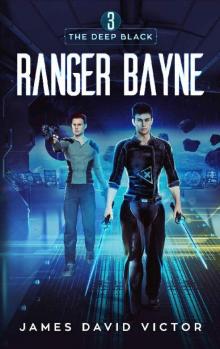 Ranger Bayne
Ranger Bayne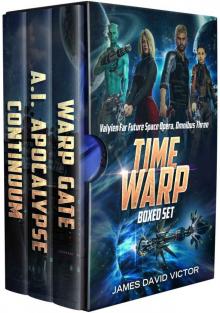 Valyien Boxed Set 3
Valyien Boxed Set 3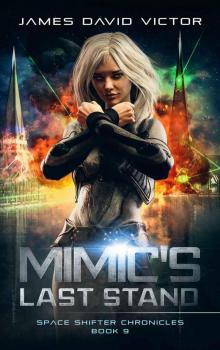 Mimic's Last Stand
Mimic's Last Stand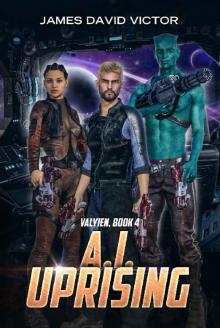 A. I. Uprising (Valyien Book 4)
A. I. Uprising (Valyien Book 4)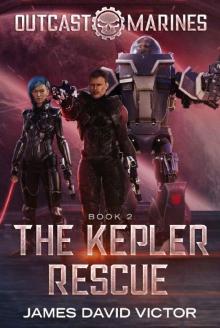 The Kepler Rescue
The Kepler Rescue Last Stand Boxed Set
Last Stand Boxed Set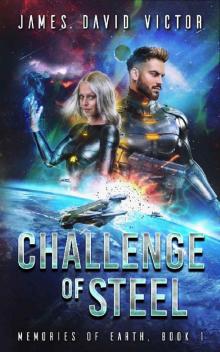 Challenge of Steel
Challenge of Steel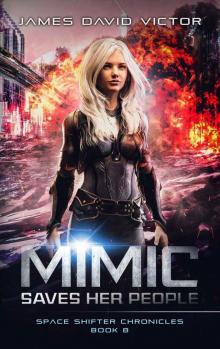 Mimic Saves Her People
Mimic Saves Her People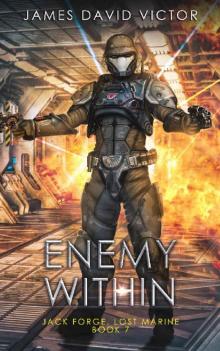 Enemy Within (Jack Forge, Lost Marine Book 7)
Enemy Within (Jack Forge, Lost Marine Book 7)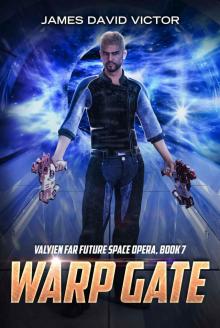 Warp Gate (Valyien Far Future Space Opera Book 7)
Warp Gate (Valyien Far Future Space Opera Book 7)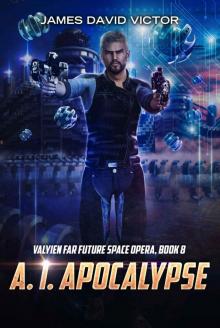 A. I. Apocalypse (Valyien Far Future Space Opera Book 8)
A. I. Apocalypse (Valyien Far Future Space Opera Book 8)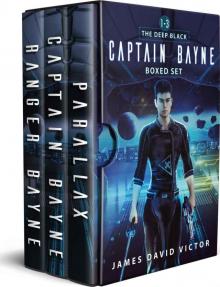 Captain Bayne Boxed Set
Captain Bayne Boxed Set Blue Star Marine Boxed Set
Blue Star Marine Boxed Set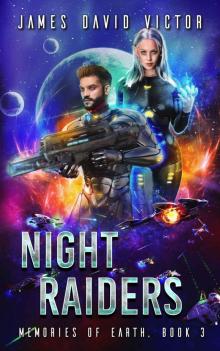 Night Raiders
Night Raiders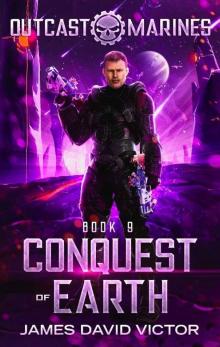 Conquest of Earth
Conquest of Earth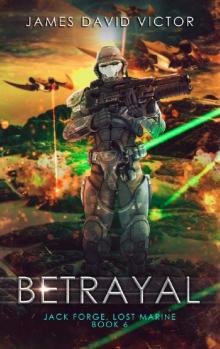 Betrayal (Jack Forge, Lost Marine Book 6)
Betrayal (Jack Forge, Lost Marine Book 6)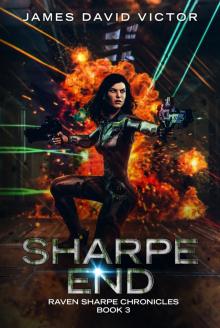 Sharpe End
Sharpe End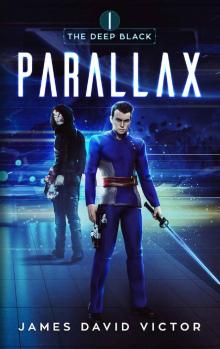 Parallax
Parallax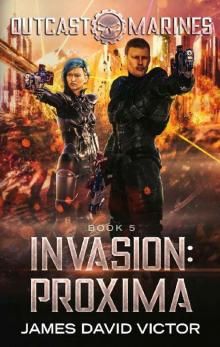 Invasion- Proxima
Invasion- Proxima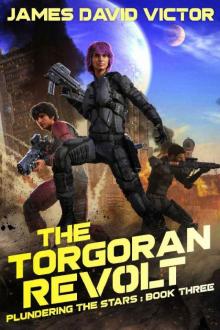 The Torgoran Revolt (Plundering the Stars Book 3)
The Torgoran Revolt (Plundering the Stars Book 3) Outcast Marines series Boxed Set 2
Outcast Marines series Boxed Set 2 Outcast Marines series Boxed Set
Outcast Marines series Boxed Set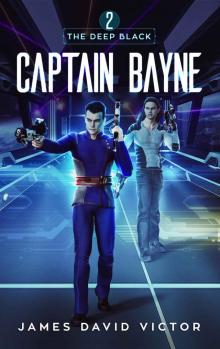 Captain Bayne
Captain Bayne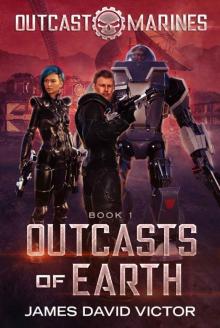 Outcasts of Earth (Outcast Marines Book 1)
Outcasts of Earth (Outcast Marines Book 1)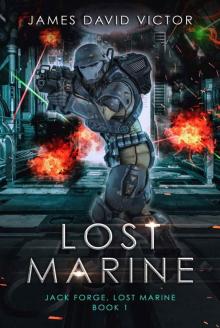 Lost Marine
Lost Marine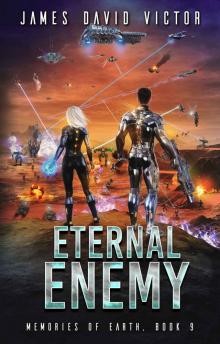 Eternal Enemy
Eternal Enemy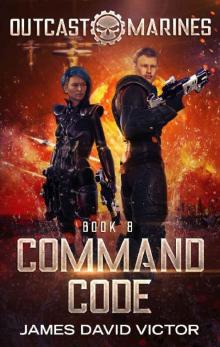 Command Code
Command Code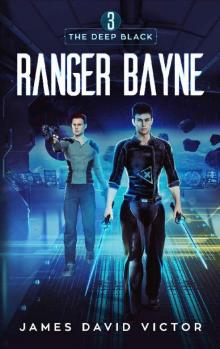 Ranger Bayne (The Deep Black Book 3)
Ranger Bayne (The Deep Black Book 3)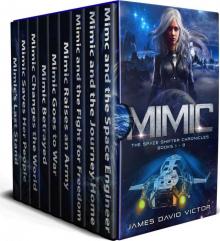 Mimic: The Space Shifter Chronicles Boxed Set (Books 1 - 9)
Mimic: The Space Shifter Chronicles Boxed Set (Books 1 - 9) The Deep Black Space Opera Boxed Set
The Deep Black Space Opera Boxed Set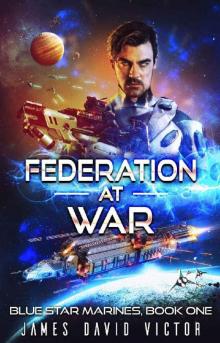 Federation at War (Blue Star Marines Book 1)
Federation at War (Blue Star Marines Book 1)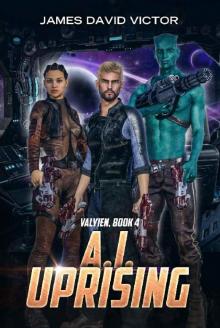 AI Uprising
AI Uprising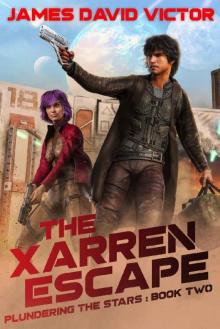 The Xarren Escape (Plundering the Stars Book 2)
The Xarren Escape (Plundering the Stars Book 2)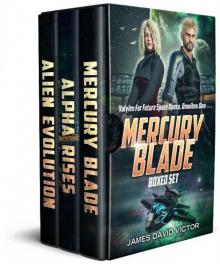 Valyien Boxed Set 1
Valyien Boxed Set 1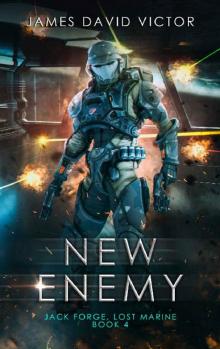 New Enemy (Jack Forge, Lost Marine Book 4)
New Enemy (Jack Forge, Lost Marine Book 4)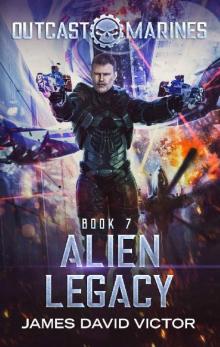 Alien Legacy
Alien Legacy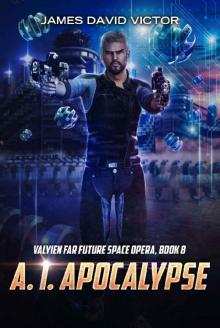 A I Apocalypse
A I Apocalypse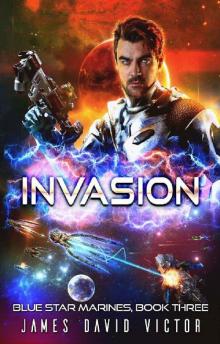 Invasion (Blue Star Marines Book 3)
Invasion (Blue Star Marines Book 3)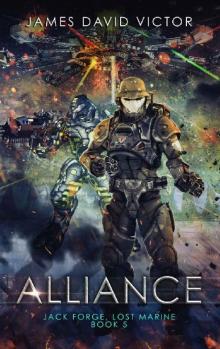 Alliance (Jack Forge, Lost Marine Book 5)
Alliance (Jack Forge, Lost Marine Book 5)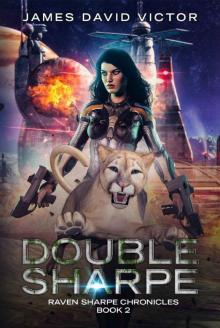 Double Sharpe (Raven Sharpe Chronicles Book 2)
Double Sharpe (Raven Sharpe Chronicles Book 2)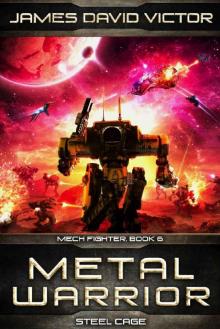 Metal Warrior: Steel Cage (Mech Fighter Book 6)
Metal Warrior: Steel Cage (Mech Fighter Book 6)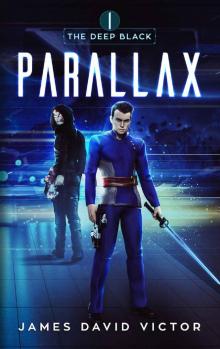 Parallax (The Deep Black Book 1)
Parallax (The Deep Black Book 1)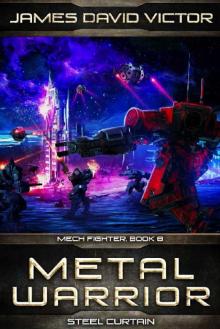 Metal Warrior: Steel Curtain (Mech Fighter Book 8)
Metal Warrior: Steel Curtain (Mech Fighter Book 8)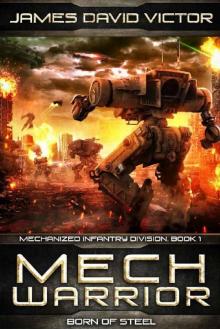 Mech Warrior: Born of Steel (Mechanized Infantry Division Book 1)
Mech Warrior: Born of Steel (Mechanized Infantry Division Book 1)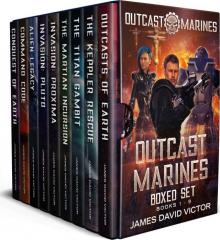 Outcast Marines Boxed Set
Outcast Marines Boxed Set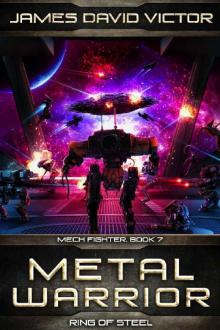 Metal Warrior: Ring of Steel (Mech Fighter Book 7)
Metal Warrior: Ring of Steel (Mech Fighter Book 7)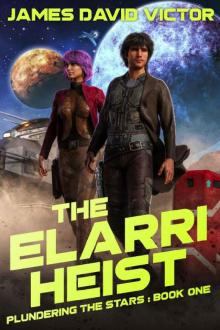 The Elarri Heist (Plundering the Stars Book 1)
The Elarri Heist (Plundering the Stars Book 1)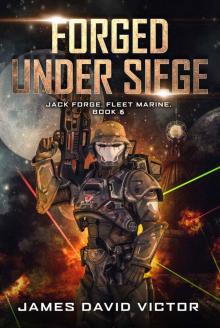 Forged Under Siege (Jack Forge, Fleet Marine Book 6)
Forged Under Siege (Jack Forge, Fleet Marine Book 6)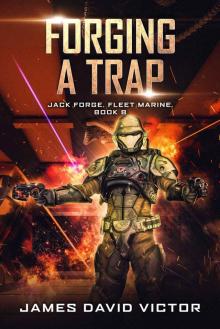 Forging a Trap (Jack Forge, Fleet Marine Book 8)
Forging a Trap (Jack Forge, Fleet Marine Book 8) Daikon (ESS Space Marines Book 2)
Daikon (ESS Space Marines Book 2)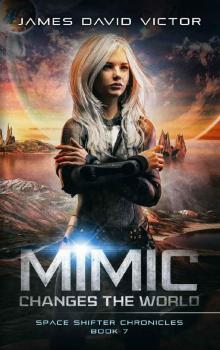 Mimic Changes the World
Mimic Changes the World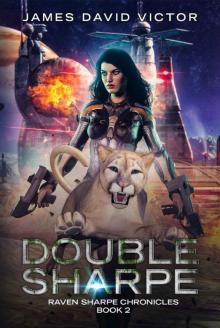 Double Sharpe
Double Sharpe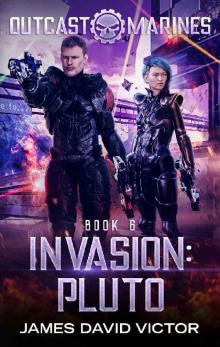 Invasion- Pluto
Invasion- Pluto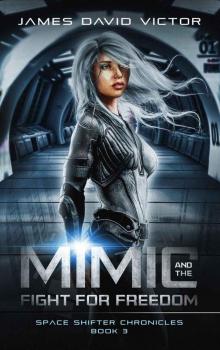 Mimic and the Fight for Freedom (Space Shifter Chronicles Book 3)
Mimic and the Fight for Freedom (Space Shifter Chronicles Book 3)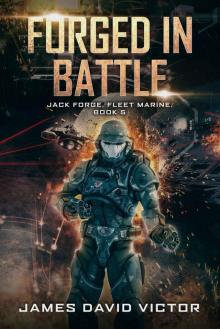 Forged in Battle (Jack Forge, Fleet Marine Book 5)
Forged in Battle (Jack Forge, Fleet Marine Book 5)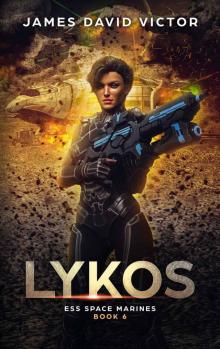 Lykos (ESS Space Marines Book 6)
Lykos (ESS Space Marines Book 6)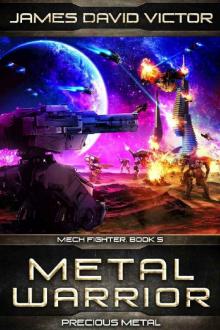 Metal Warrior: Precious Metal (Mech Fighter Book 5)
Metal Warrior: Precious Metal (Mech Fighter Book 5)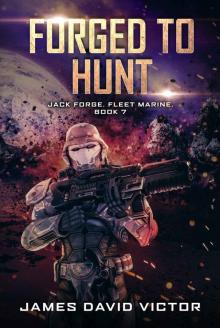 Forged to Hunt
Forged to Hunt Earth Space Service Space Marines Boxed Set
Earth Space Service Space Marines Boxed Set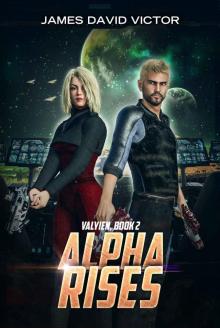 Alpha Rises
Alpha Rises Power of the Seers (Dragon Oracle Book 4)
Power of the Seers (Dragon Oracle Book 4)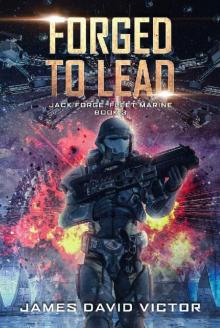 Forged to Lead (Jack Forge, Fleet Marine Book 3)
Forged to Lead (Jack Forge, Fleet Marine Book 3)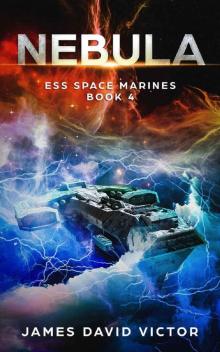 Nebula (ESS Space Marines Book 4)
Nebula (ESS Space Marines Book 4)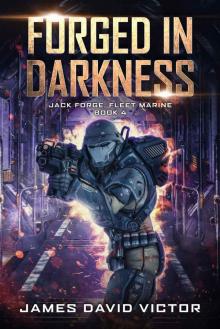 Forged in Darkness
Forged in Darkness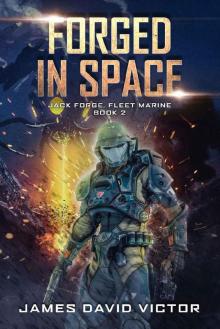 Forged in Space
Forged in Space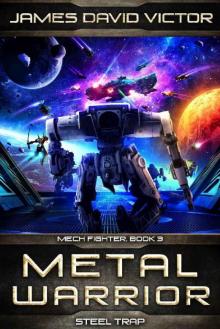 Metal Warrior: Steel Trap (Mech Fighter Book 3)
Metal Warrior: Steel Trap (Mech Fighter Book 3)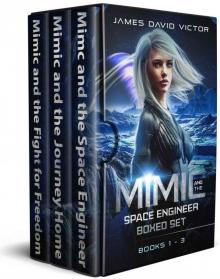 Mimic and the Space Engineer Boxed Set, Books 1 - 3
Mimic and the Space Engineer Boxed Set, Books 1 - 3 World Breaker Boxed Set (ESS Space Marines Omnibus Book 3)
World Breaker Boxed Set (ESS Space Marines Omnibus Book 3)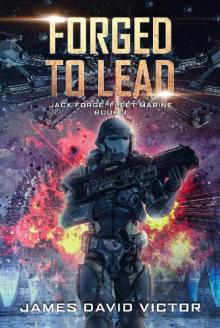 Forged to Lead
Forged to Lead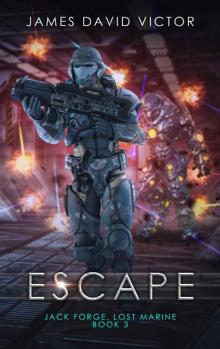 Escape (Jack Forge, Lost Marine Book 3)
Escape (Jack Forge, Lost Marine Book 3)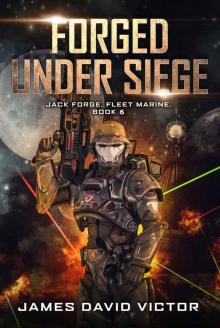 Forged Under Siege
Forged Under Siege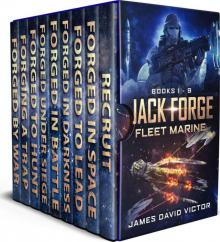 Jack Forge, Fleet Marine Boxed Set (Books 1 - 9)
Jack Forge, Fleet Marine Boxed Set (Books 1 - 9)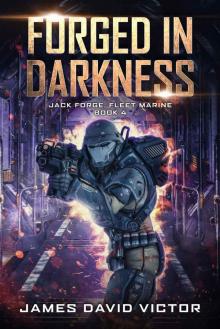 Forged in Darkness (Jack Forge, Fleet Marine Book 4)
Forged in Darkness (Jack Forge, Fleet Marine Book 4) Insurrection
Insurrection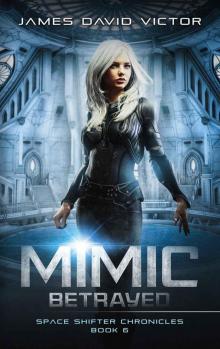 Mimic Betrayed (Space Shifter Chronicles Book 6)
Mimic Betrayed (Space Shifter Chronicles Book 6)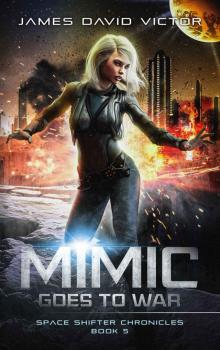 Mimic Goes to War (Space Shifter Chronicles Book 5)
Mimic Goes to War (Space Shifter Chronicles Book 5)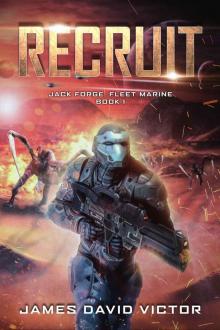 Recruit (Jack Forge, Fleet Marine Book 1)
Recruit (Jack Forge, Fleet Marine Book 1)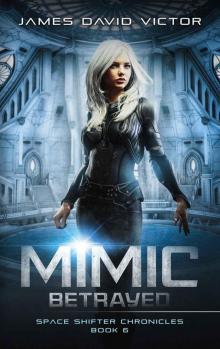 Mimic Betrayed
Mimic Betrayed Power of the Seers
Power of the Seers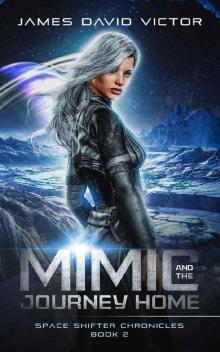 Mimic and the Journey Home (Space Shifter Chronicles Book 2)
Mimic and the Journey Home (Space Shifter Chronicles Book 2)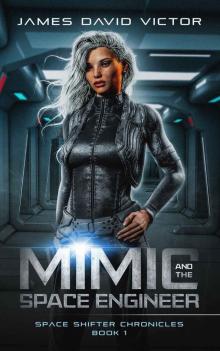 Mimic and the Space Engineer (Space Shifter Chronicles Book 1)
Mimic and the Space Engineer (Space Shifter Chronicles Book 1)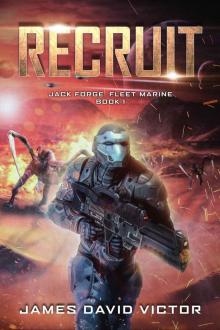 Recruit
Recruit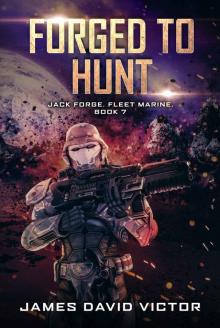 Forged to Hunt (Jack Forge, Fleet Marine Book 7)
Forged to Hunt (Jack Forge, Fleet Marine Book 7)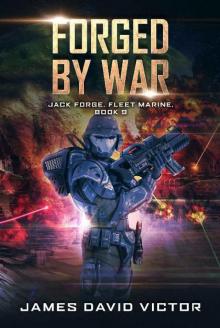 Forged by War (Jack Forge, Fleet Marine Book 9)
Forged by War (Jack Forge, Fleet Marine Book 9)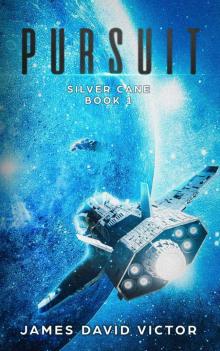 Pursuit (Silver Cane Book 1)
Pursuit (Silver Cane Book 1) Zenith (ESS Space Marines Book 1)
Zenith (ESS Space Marines Book 1) Star Chaser (ESS Space Marines Book 3)
Star Chaser (ESS Space Marines Book 3)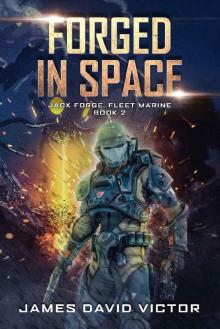 Forged in Space (Jack Forge, Fleet Marine Book 2)
Forged in Space (Jack Forge, Fleet Marine Book 2)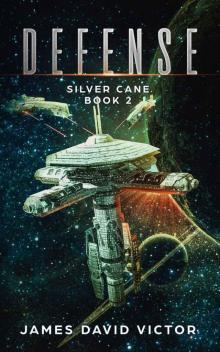 Defense (Silver Cane Book 2)
Defense (Silver Cane Book 2)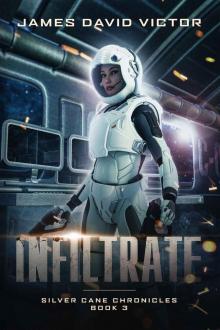 Infiltrate (Silver Cane Chronicles Book 3)
Infiltrate (Silver Cane Chronicles Book 3)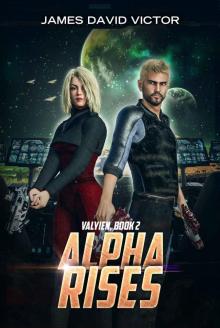 Alpha Rises (Valyien Book 2)
Alpha Rises (Valyien Book 2)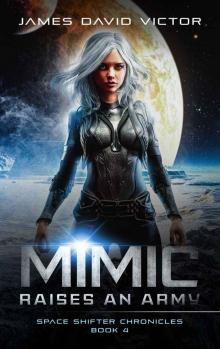 Mimic Raises an Army
Mimic Raises an Army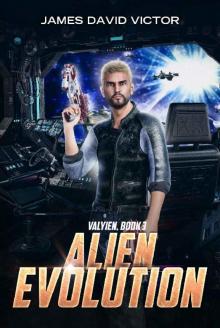 Alien Evolution (Valyien Book 3)
Alien Evolution (Valyien Book 3)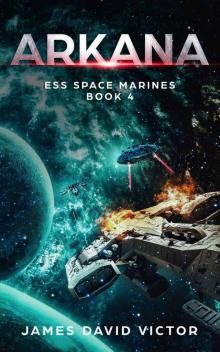 Arkana (ESS Space Marines Book 4)
Arkana (ESS Space Marines Book 4)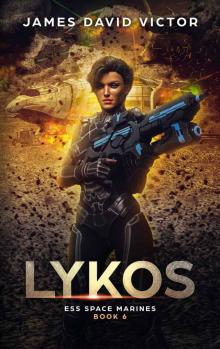 Lykos
Lykos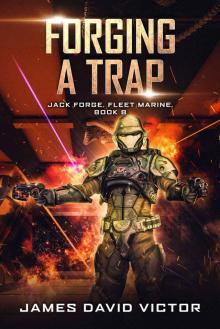 Forging a Trap
Forging a Trap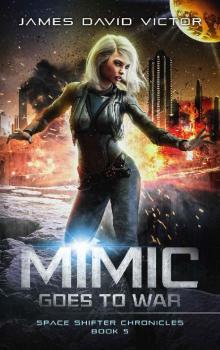 Mimic Goes to War
Mimic Goes to War Earth Space Service Boxed Set: Books 1 - 3 (ESS Space Marines Omnibus)
Earth Space Service Boxed Set: Books 1 - 3 (ESS Space Marines Omnibus) Stranded (ESS Space Marines Book 7)
Stranded (ESS Space Marines Book 7)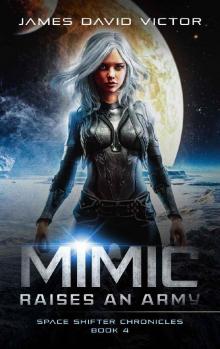 Mimic Raises an Army (Space Shifter Chronicles Book 4)
Mimic Raises an Army (Space Shifter Chronicles Book 4)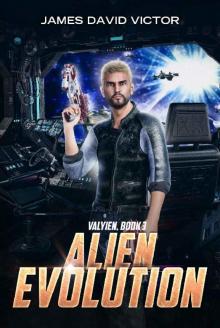 Alien Evolution
Alien Evolution